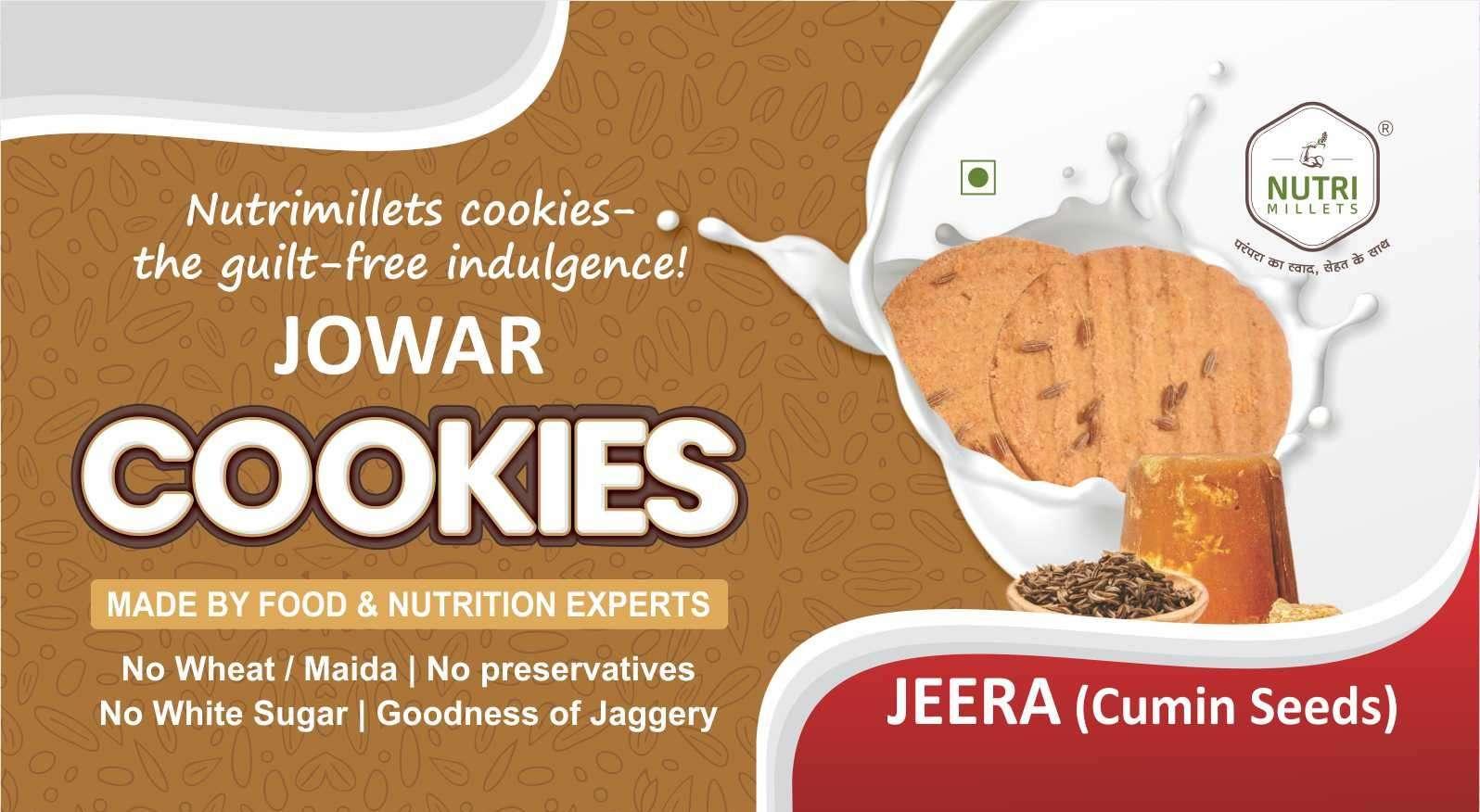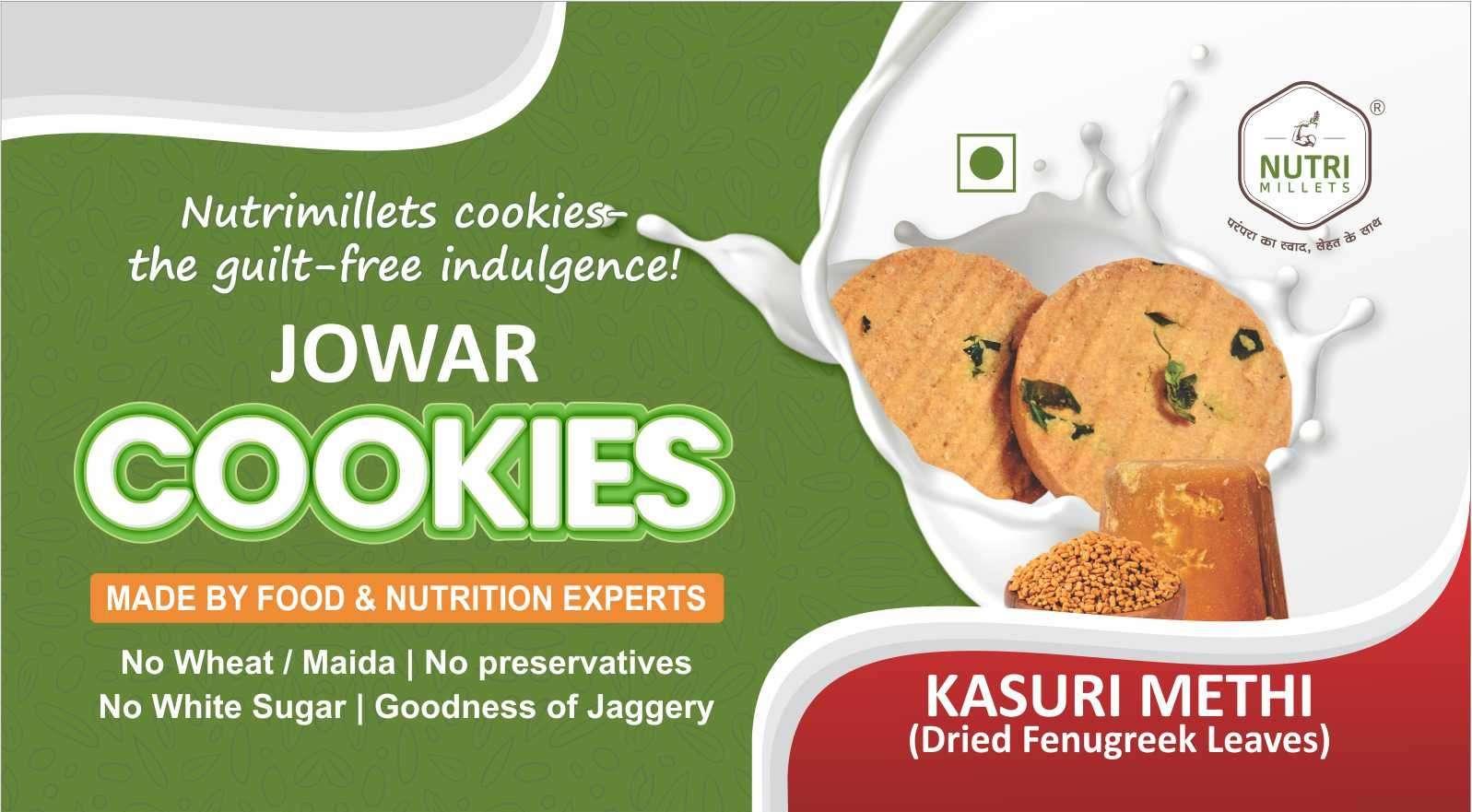Nutrimillets Mini Nutri Packs – Cookies – 250 grams
Original price was: ₹125.0.₹100.0Current price is: ₹100.0. / Grams
Packing – 250g (50g X 5)
Price – Rs.120/-
Best buy – Rs. 100/- (5 Assorted Flavors / single flavor 5 pcs)
Shelf life – 5 Months
- Description
- Additional information
- Reviews (0)
- Q & A
- Sustainability Remark
- More Offers
- Store Policies
- Inquiries
Nutri millets mini cookies:
In the realm of breakfast and snacks, a noteworthy shift towards healthier alternatives is embodied by the rise of millet-based food products. Transitioning from traditional grains, millets emerge as nutritional powerhouses, reshaping the food landscape.
To commence, millets, a diverse group of small-seeded grasses, serve as the foundation for a myriad of breakfast and snack options. From millet porridge to granola bars, these products offer a delectable fusion of taste and health benefits.
Transitioning from conventional cereal grains, millets boast a rich nutritional profile. Packed with essential nutrients like fiber, vitamins, and minerals, they contribute to overall well-being and aid in combating lifestyle-related diseases.
The versatility of millets in snack preparation is noteworthy. Millet-based snacks, such as baked millet chips or millet-based energy bars, cater to the growing demand for on-the-go, nutritious alternatives. These snacks are not only convenient but also satiate cravings without compromising health.
Moreover, millet products align with the trend of gluten-free and allergen-friendly options. They cater to individuals with dietary restrictions, offering a wholesome alternative that doesn’t compromise on taste or nutritional value.
The benefits extend beyond personal health; millet cultivation promotes sustainable agriculture. These hardy crops require less water and are well-adapted to diverse agroecological zones, contributing to water conservation and soil health.
Nutri millets mini cookies: As consumer awareness grows, the food industry responds with innovative millet-based products. Breakfast cereals, muffins, and even millet-based pasta are becoming staples, offering a delightful departure from traditional breakfast and snack choices.
In conclusion, the elevation of millet-based food products in the breakfast and snacks domain signifies a shift towards holistic well-being and sustainable food choices. The amalgamation of nutritional benefits, versatility, and environmental sustainability positions millets as a transformative force in shaping the future of breakfast and snack options.
| Weight | 0.25 kg |
|---|
You must be logged in to post a review.
Q & A
1. Ingredient Sourcing
- Sustainable Agriculture: If the ingredients for the cookies are sourced from sustainable agriculture, this reduces the environmental impact. Organic farming practices, for example, avoid synthetic pesticides and fertilizers, which reduces soil and water pollution.
- Local Sourcing: Ingredients sourced locally can significantly reduce transportation emissions, which is a major contributor to the carbon footprint of food products.
- Plant-based Ingredients: If the cookies are made with plant-based ingredients rather than animal products (e.g., using plant-based butter or milk substitutes), this can lower the carbon footprint. Animal agriculture is generally more carbon-intensive due to methane emissions from livestock and the energy-intensive nature of animal feed production.
2. Production Process
- Energy-Efficient Manufacturing: If the cookies are produced in facilities that use renewable energy sources (like solar or wind power) or have energy-efficient processes, this can significantly reduce the carbon emissions associated with production.
- Waste Reduction: Minimizing food waste during production (e.g., by using every part of the raw ingredients) and optimizing the use of resources like water and energy contribute to sustainability.
3. Packaging
- Eco-friendly Packaging: Sustainable packaging options such as biodegradable, compostable, or recyclable materials can lower the environmental impact. Reducing the amount of packaging material also contributes to a lower carbon footprint.
- Minimalist Design: Using less material and reducing the size or weight of the packaging can decrease transportation-related emissions.
4. Transportation
- Efficient Distribution: If the product distribution is optimized to minimize travel distances, or if the company uses low-emission transportation options, this reduces the overall carbon footprint.
5. End-of-Life Considerations
- Compostability: If the cookies or their packaging are compostable, this reduces waste and can contribute to a circular economy, where materials are reused rather than discarded.
- Consumer Education: Encouraging consumers to recycle or compost packaging and reduce waste can further enhance the sustainability of the product.
Scientific Explanation
The carbon footprint of a product is determined by the total greenhouse gas (GHG) emissions produced throughout its lifecycle—from the extraction of raw materials to production, transportation, use, and disposal. For food products like cookies, significant factors include the agricultural practices used to grow ingredients, the energy used in manufacturing, the emissions associated with packaging, and the efficiency of transportation.- Plant-based vs. Animal-based Ingredients: According to a study published in Nature Food, plant-based diets tend to have lower carbon footprints than diets rich in animal products due to the lower GHG emissions associated with growing plants versus raising animals .
- Sustainable Agriculture: Research shows that sustainable farming practices, such as organic farming and agroforestry, can sequester carbon in soil and reduce emissions by minimizing the use of synthetic fertilizers and pesticides .
- Renewable Energy in Production: A study in Renewable and Sustainable Energy Reviews found that switching to renewable energy sources in food production can cut GHG emissions by up to 80% compared to using fossil fuels .
References
- Poore, J., & Nemecek, T. (2018). Reducing food’s environmental impacts through producers and consumers. Science, 360(6392), 987-992.
- IPCC (Intergovernmental Panel on Climate Change). (2019). Climate Change and Land: An IPCC Special Report on Climate Change, Desertification, Land Degradation, Sustainable Land Management, Food Security, and Greenhouse Gas Fluxes in Terrestrial Ecosystems.
- Röös, E., Garnett, T., Watz, V., & Säll, S. (2019). The role of producers in the carbon footprint of food products. Nature Food, 1(1), 1-7.
General Inquiries
There are no inquiries yet.








Reviews
There are no reviews yet.